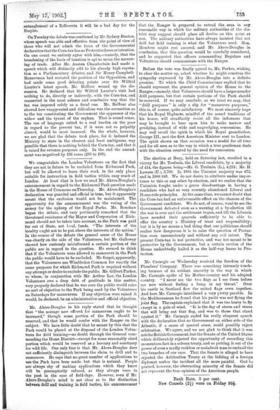Mr. Carnegie on Wednesday received the freedom of the Plumbers'
Company. There was something intensely touch- ing because of its evident sincerity in the way in which Mr. Carnegie spoke of his Mother-country and his adopted country. "I never see the two flags as I see them before me now without feeling a lump in my throat." Over his castle in Scotland flew the united flags sewn together. And here Mr. Carnegie introduced a very pretty parable. In the Mediterranean he fcund that his yacht was not flying the joint flag. The captain explained that it was too heavy to fly except in a gale of wind. " It is the day of storm and stress that will bring out that flag, and woe to those that stand against it." Mr. Carnegie ended his really eloquent speech with the declaration that no Government on either side of the Atlantic, if a cause of quarrel arose, could possibly reject arbitration. We agree, and we are glad to think that it was notthe British Government, but the Senate of the United States which deliberately rejected the opportunity of recording this momentous fact in a solemn treaty, and so putting it out of the power of even a madly reckless or maladroit man to embroil the two branches of our race. That the Senate is alleged to have rejected the Arbitration Treaty at the bidding of a foreign diplomat makes the incident all the more painful. God be praised, however, the obstructing minority of the Senate did not represent the true opinion of the American people.






































 Previous page
Previous page